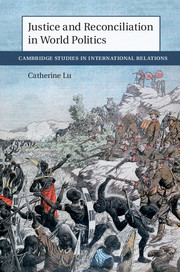Crossref Citations
This Book has been
cited by the following publications. This list is generated based on data provided by Crossref.
Forst, Rainer
2017.
Noumenal Alienation: Rousseau, Kant and Marx on the Dialectics of Self-Determination.
Kantian Review,
Vol. 22,
Issue. 4,
p.
523.
Weldon, S. L.
2018.
Gender and global justice: Lu’s justice and reconciliation in world politics.
Ethics & Global Politics,
Vol. 11,
Issue. 1,
p.
31.
Lu, Catherine
2018.
Redressing and addressing colonial injustice.
Ethics & Global Politics,
Vol. 11,
Issue. 1,
p.
1.
Niezen, Ronald
2018.
Speaking for the dead: the memorial politics of genocide in Namibia and Germany.
International Journal of Heritage Studies,
Vol. 24,
Issue. 5,
p.
547.
Unger, Mathilde
and
Roussin, Juliette
2018.
Frontiers of Responsibility for Global Justice.
Journal of Social Philosophy,
Vol. 49,
Issue. 3,
p.
381.
Abdel-Nour, Farid
2018.
Responsibility for structural injustice.
Ethics & Global Politics,
Vol. 11,
Issue. 1,
p.
13.
Lu, Catherine
2018.
Responsibility, Structural Injustice, and Structural Transformation.
Ethics & Global Politics,
Vol. 11,
Issue. 1,
p.
42.
Eisenberg, Avigail
2018.
The challenges of structural injustice to reconciliation: truth and reconciliation in Canada.
Ethics & Global Politics,
Vol. 11,
Issue. 1,
p.
22.
Digeser, Paige E.
2018.
Motivation and reconciliation in Catherine Lu’s conception of global justice.
Ethics & Global Politics,
Vol. 11,
Issue. 1,
p.
6.
Butler, Michael J.
2019.
Adaptive Peacemaking in Protracted Conflicts: IGAD Mediation in the Second Sudanese Civil War.
Global Policy,
Vol. 10,
Issue. S2,
p.
93.
Bessone, Magali
2019.
Colonial Slave Trade and Slavery and Structural Racial Injustice in France: Using Iris Young’s Social Connection Model of Responsibility.
Critical Horizons,
Vol. 20,
Issue. 2,
p.
161.
Nuti, Alasia
2019.
Injustice and the Reproduction of History.
Durbach, Andrea
2019.
Keeping justice at bay: institutional harms and the damaging cycle of reparative failureThe 2018 John Barry Memorial Lecture.
Australian Journal of Human Rights,
Vol. 25,
Issue. 2,
p.
200.
Brännmark, Johan
2019.
Principles of justice and the idea of practice-dependence.
Ethics & Global Politics,
Vol. 12,
Issue. 3,
p.
1.
Head, Naomi
2020.
Sentimental politics or structural injustice? The ambivalence of emotions for political responsibility.
International Theory,
Vol. 12,
Issue. 3,
p.
337.
Owen, David
2020.
Migration, structural injustice and domination on ‘race’, mobility and transnational positional difference.
Journal of Ethnic and Migration Studies,
Vol. 46,
Issue. 12,
p.
2585.
Thompson, Simon
2020.
Alienation and Establishment.
Religions,
Vol. 11,
Issue. 6,
p.
282.
Murphy, Colleen
2020.
III—On Principled Compromise: When Does a Process of Transitional Justice Qualify as Just?.
Proceedings of the Aristotelian Society,
Vol. 120,
Issue. 1,
p.
47.
Niesen, Peter
2020.
Nonalienation among peoples: Symposium on Catherine Lu’s Justice and Reconciliation in World Politics.
Critical Review of International Social and Political Philosophy,
Vol. 23,
Issue. 4,
p.
518.
Kuokkanen, Rauna
2020.
Reconciliation as a Threat or Structural Change? The Truth and Reconciliation Process and Settler Colonial Policy Making in Finland.
Human Rights Review,
Vol. 21,
Issue. 3,
p.
293.



